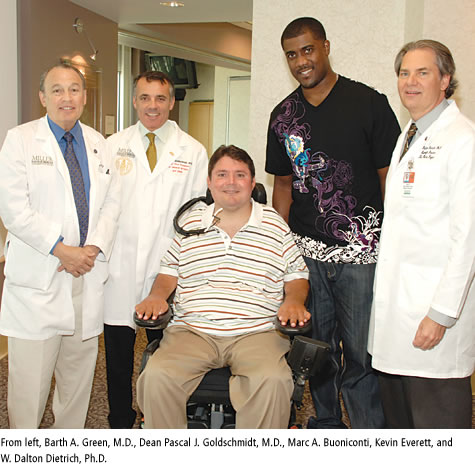Hypothermia Therapy a Major Advance
On His Feet Again After NFL Injury,
Kevin Everett Thanks The Miami Project
Former Hurricane and NFL player Kevin Everett, a man many believed would never walk again, stood tall on the Miller School’s campus March 27 during a visit to The Miami Project to Cure Paralysis. He was there to announce the launch of the Kevin Everett Foundation and to thank The Miami Project team whose cutting-edge research ultimately played a role in his recovery from a spinal cord injury suffered during an NFL game last season.

Everett, whose recovery was called miraculous, was given a hypothermic treatment, the introduction of a cold saline solution into the system. In groundbreaking research at The Miami Project, physicians and scientists have demonstrated the experimental treatment significantly decreases damage to the spinal cord.
Andrew Cappuccino, M.D., the Buffalo Bills doctor who treated Everett after his spinal cord injury, learned about the hypothermia treatment at a seminar conducted by W. Dalton Dietrich, Ph.D., The Miami Project’s scientific director, in Palm Beach in 2006.
“It’s amazing all the research they have been doing here,” said Everett, a former Buffalo Bills tight end who sustained a life-threatening spinal cord injury in a game against the Denver Broncos. “It saved my life. I am up and moving and walking around. I am so thankful and appreciative of it all.”
At a news conference in the Lois Pope LIFE Center, Everett was flanked by Pascal J. Goldschmidt, M.D., senior vice president for medical affairs and dean of the Miller School; Marc A. Buoniconti, president of The Miami Project; Barth A. Green, M.D., co-founder of The Miami Project and chairman of the Department of Neurological Surgery; and Dietrich.
Buoniconti, Green, and Dietrich said they were thrilled that Everett benefited from research at UM and that his foundation would partner with The Miami Project.
“What is the chance that the one team doctor who attended the lecture was on the field with this guy when he went down, and the prognosis was that he wouldn’t walk again,” Green said. “Dr. Cappuccino was very bold to treat him like his own son and take a chance and use this experimental therapy.”
Everett’s story, Dietrich added, is good testimony for the cutting-edge science being conducted at The Miami Project. The organization is now getting calls from physicians and scientists from as far away as Europe and Australia inquiring about joining in a hypothermia clinical trial. Dietrich says a large clinical trial population is needed, and positive results could mark a significant advancement in the treatment of not only spinal cord injuries, but traumatic brain injury too.
Dietrich, who joined Cappuccino in a presentation to the NFL, said some team doctors would now have cold saline on hand and make decisions about if and when they might use it to treat an injury.